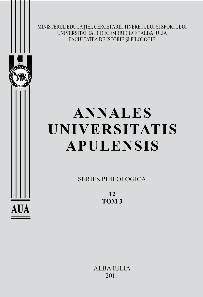Universul spaimelor în nuvelele lui Constantin Mateescu
The World of Fright in Constantin Mateescu’s Short Stories
Author(s): Lavinia GeambeiSubject(s): Literary Texts
Published by: Universitatea »1 Decembrie 1918« Alba Iulia
Keywords: character-narrator; fear; suspicion; control; nomenclature
Summary/Abstract: Constantin Mateescu, the writer who started relatively late, at the age of 37, with the volume of short stories Anemone dress, in 1966, probably to keep the proper distance from the proletcultist literature of the „obsessing” decade, appeared to be a prolific writer present every year in the library with one book at least, the author of a work of great thematic consistency and expressiveness, continuing the prewar tradition of our prose. The rich work (over 40 volumes) of the writer from Valcea town immediately captivated by analytical perspective, realism of representation, poem-like enunciation, the atmosphere created and the narrative structure, but also through the power of evoking the world and shaping the characters within their social background. After that, through most of his books, novels or short prose Constantin Mateescu had wistfully revealed us a „lost world” of inter-war pre-communist Romania, a period in which Romanians had a normal lifestyle, living without complexes and unprovincially through the new volume I married a communist, published at Almarom Publishing House (Valcea Town) 2008, his writing dealt with a different stage in the history of Romanian society troubled by fear, falsity, and grotesque, the communist period. To better penetrate the psychology of the absurd nomenclature, the writer extended observation in two short stories of the volume and after 1989, the first years of post-communist Romania, seeking „surprising” changes of the former still in power. Starting from this premise, the paper aims to trace the way in which the universe of fear is built, with its forms and consequences, in the short stories of this volume which strictly re-creates the communist period, since Fear is the theme of these narratives. It may, of course, be associated with other works of our literature, which reconstruct the communist world, especially Ion D. Sarbu’s antitotalitarian novel. Almost all of these narratives are recounted in the first person, the character-narrator being a young intellectual, usually a student, teacher, artist, or a graduate looking for a job; a single short story is centered around a heroine who confesses, revealing the nomenclature habits while working as a maid in their houses, but especially revealing adverse consequences of such experience. These young people understand the absurdity of the regime in which they live, so that they give up “high ideals”, social ambitions, trying to take advantage of the small joys of existence, such as the hidden reading of forbidden books, “fleeting” passions, the pleasure of group meetings, to share their impressions of reading and common musical tastes, so wanted a friendship, especially in such times, but being itself a danger. However, in a terrorist regime as communism, in which everything is under control, the idea of privacy for the individual disappears, even these “petty ideals” cannot be achieved. The character's desire to escape from such a world of evi
Journal: Annales Universitatis Apulensis. Series Philologica
- Issue Year: 12/2011
- Issue No: 1
- Page Range: 107-116
- Page Count: 10
- Language: Romanian

